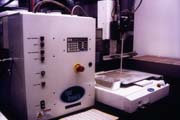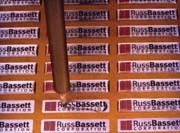
In a move to obtain tighter control of manufacturing and reduce lead times, one of the nation's top label suppliers has chosen a dispensing system that features progressing cavity pump technology for two-part polyurethane doming resins. Steven Label, Santa Fe Springs, CA, has specified a benchtop system from Fluid Research Corp., Tustin, CA, featuring a positive-displacement design that has no pistons or check valves, eliminating the problems caused by out-of-phase pistons and improper valve seating. The compact unit will reduce the label maker's reliance on contract manufacturing for its domed label products, improving customer service and lead time.
"In the past, doming was one of the few operations that we contracted out," says Ken Klein, Steven Label director of Engineering. "As with any subcontracted work, we had less control of lead times than we would have with an in-house operation, and this sometimes created problems for our customers."
From the beginning, product quality was a key issue for Klein and his staff. "We needed a very precise flow rate and mix ratio for this resin formulation, and it was critical to prevent air from getting into the system," he says. "We liked the positive displacement design, and we felt that the simple, reliable operation would help ensure consistently high-product quality."
The use of domed label products appears to be growing as OEMs look to emblems, logos and tags with distinctive aesthetics to attract attention and portray a quality image. The extremely durable, eye-catching technique of printing or embossing a label and then encapsulating with a thick resin coating (typically ~60 mils or so) is usually associated with high-end consumer products. Current applications include medical devices, computers, home appliances and cars, as well as industrial equipment and promotional items.
To suit Steven Label's exacting quality standards and meet production needs for a range of label sizes, Klein and his staff chose the PluraShot® design from Fluid Research, fitted with a custom-designed manifold for multi-label dispensing. The machine is equipped with a three-axis robot and programmable microprocessor that stores dispensing coordinates, shot sizes, and other data for all production runs.

Klein said that with the manifold in place, the company can dispense from up to six points at a time using a single static mixing tip, an obvious advantage when some sheets hold as many as 150 labels. "Most of our domed products are between 1-10 square inches in size, but we now have the capacity to manufacture this type of label anywhere from one-half to 15 square inches," he added. Dispense cycle times currently average 5-10 minutes per sheet, and the resin has a gel time of about 20 minutes.
"For manufacturers who produce many varied products, the ability to set up and recall programs is a major advantage, drastically reducing setup and equipment downtime," says Stephen Gordon, director of Engineering at Fluid Research. "With mix ratios and dispense rates stored in a program, the machine's setup time for subsequent runs is reduced to nearly zero."
This flexibility and intuitive operation doesn't come at the expense of process quality, however. Preventing fluid cavitation at the pump inlet is a major concern when working with optically clear materials such as doming resins, as pressure variations at the pump inlet can result in the formation of small bubbles that appear in the final product. The PluraShot's servo-drive and rotary pump action allow micro-flow rate adjustments that help prevent cavitation.
Taking the entire doming operation in-house meant designing an entirely new workspace within the Steven Label plant. To control dust and contaminants that produce defects in the air-cured resin, Steven Label created a soft-walled, environmentally controlled workspace equipped with a HEPA-filtered air supply. Fluid Research also designed and built two worktables for the doming area - one for the tabletop robot and dispensing machine, the other for work in progress. The matched height of the surfaces facilitates workflow, and additional shelving built by Steven Label increases cure space for the 100% solids resin.
Founded in 1954, Steven Label currently serves customers around the world from its manufacturing plant in Santa Fe Springs, CA. In addition to domed labels, the firm is a manufacturer of custom overlays and nameplates, roll labels, variable data and serialized labels, UL/CSA-approved labeling, membrane switches, shields/insulators, thermal transfer ribbons, and other specialty products. For more information, contact Steven Label Corp., 11926 Burke St., Santa Fe Springs, CA 90670; phone (800) 752-4968; fax (562) 698-1507; or visit http://www.stevenlabel.com.
Fluid Research Corp. was founded in 1996 to provide superior accuracy in dispensing multiple component adhesives, sealants and polymers. The company uses a patented system of progressing cavity pumps and sophisticated electronic controls in its line of metering and dispensing equipment, which is typically custom-engineered to user specifications. Its products are used in a variety of industries, including automotive components, aerospace fabrication, electronics, polymer molding, chemical fastening, ID labeling and filtration devices. For more information, contact Fluid Research Customer Service, 1382 Bell Ave., Tustin, CA 92780; phone (714) 258-2350; fax (714) 258-2352; e-mail sales@fluidresearch.com; or visit http://www.fluidresearch.com.